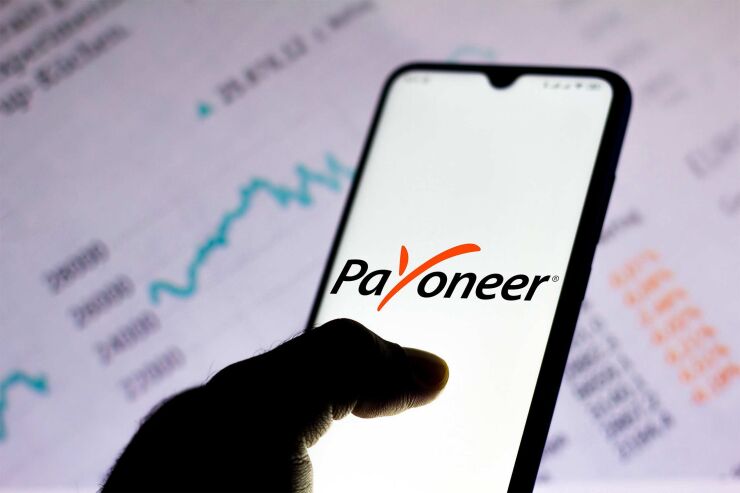
Part of Klarna's quest to go public in the U.S. was to build scale through a series of high-profile partnerships. And while Trump's tariffs have delayed the IPO, the Swedish financial institution is still lining up partners.
Klarna has signed an agreement with Fiserv's Clover to enable payments and buy now/pay later lending at more than 100,000 merchant locations. The deal is the latest of several
The partnerships have boosted Klarna's addressable merchant market in the U.S. past 1 million. Beyond Clover, Klarna's partners include
Other recent Klarna distribution deals include Adyen, Apple, Staples, Worldpay and RiteAid.
While Klarna has delayed its IPO, it is still in the midst of a multiyear strategy to build a market in the U.S. in competition with firms that have greater brand recognition, such as PayPal, Block and the card networks. By adding Clover, Klarna is integrating with
Clover was part of Fiserv's 2019 acquisition of payments processor First Data, which initially built Clover as a competitive counter to the payment hardware Square was selling to small businesses. Clover helped Fiserv

Payoneer closes payment deal in China
While a major portion of the global trade volatility involves a dispute between President Donald Trump and China, the Asian nation is still an attractive market for outside payment companies.
Payoneer has completed its late 2024 deal to buy China-based transaction processor Easylink Payment, enabling Payoneer to support e-commerce payments inside China.
Visa, Mastercard and other payment companies for years have tried to establish
Companies that have made
Terms of the Payoneer/Easylink acquisition were not disclosed.
The deal "strengthens our global regulatory infrastructure and positions us to better serve those customers with enhanced and localised products and services," Payoneer CEO John Caplan said in a release.
The 20-year-old Payoneer sells cross-border payments for business clients covering more than 190 countries and 70 currencies. —John Adams

AgriDex launches stablecoin-powered payments platform for farmers
AgriDex, a global marketplace for agriculture, launched a payments platform called Loam for stablecoin-powered cross-border transactions in the agricultural industry with a specific focus on Africa.
Loam uses Solala blockchain technology for the payments. Users access a web application to trade, receive payments and manage invoices, according to AgriDex. Transactions are settled in less than five seconds and have fees just under 0.5%.
Loam counts African agricultural businesses such as Parrogate and Demeter Holdings as clients and is targeting $40 million in transaction volume by the end of 2025.
"Agriculture is one of the few industries in which every country actively participates, regardless of economic or political differences," AgriDex Founder and CEO Henry Duckworth said in a statement.
"Unlike other commodities, agricultural goods are universally traded because food security is a global priority. Loam ensures its solution is relevant and widely applicable and allows seamless cross-border transactions, helping producers, traders and buyers operate more efficiently. Better payments mean a stronger food supply chain." —Joey Pizzolato

Wise to open new hub in Hyderabad, India
Global money transfer fintech Wise is set to open a new hub in Hyderabad, India, by the end of the year and plans to hire hundreds of employees over the next few years.
The hub is due to open in the second half of this year and will initially hire in product, engineering and servicing operations. Smrithi Ravi, Wise's APAC head of engineering, will lead the hub in Hyderabad. Ravi has spent more than six years leading a team of over 30 engineers at the company's regional hub in Singapore.
"India's tech talent ecosystem is world-class, and I'm excited to return home to lead Wise's newest full stack hub in Hyderabad," Ravi said in a statement. The teams in Hyderabad will play a crucial role in Wise's global infrastructure and product development.
Wise has had a presence in India since 2013. —Joey Pizzolato

EWA provider Tapcheck secures $225M in funding
Earned wage access provider Tapcheck has secured $225 million in debt and equity financing that the fintech plans to use to expand its product suite.
The funding round includes a $25 million Series A extension led by PeakSpan Capital, and a $200 million credit facility from Victory Park Capital. Tapcheck will use the funds to accelerate the expansion of artificial intelligence capabilities, develop a new unnamed product and enhance its Mastercard offering.
Tapcheck, founded in 2019, counts Hilton, Planet Fitness, Taco Bell, McDonald's and Jiffy Lube as clients and has funded more than $1 billion of earned wage access payouts across 12,000 employer locations in the last five years, according to the company. —Joey Pizzolato

Revolut expats sign stablecoin distribution deal with Mastercard
Distributed finance startup Bleap is partnering with Mastercard to support a potential merchant network for stablecoin payments.
The U.K.-based Bleap, which was founded in December by former Revolut executives Joao Alves and Guilherme Gomes, offers trading, exchange features, stablecoin buying and selling, and a debit card.
Bleap also supports stablecoin conversions to traditional currency, a key step in using stablecoins at the point of sale. By linking to Mastercard, Bleap's customers can use this conversion to make payments at more than 150 million merchants through the card network's Web3 payment program, which works with developers of technology for distributed finance and other emerging internet technology.
Stablecoins, which are designed to hedge against the volatility in other digital currencies, are the most likely cryptocurrency type to be used for payments.

EBay signs Checkout.com for merchant services
Online marketplace eBay has partnered with London-based payment platform Checkout.com to support transaction processing for sellers.
The partnership provides Checkout.com access to a market with more than 2.3 billion live listings as of Wednesday, covering more than 190 markets.
"Payments performance is critical at this enterprise-level scale, and our technology, data, and acquiring expertise will help eBay maximize acceptance in global markets and drive efficiency across its platform," Guillaume Pousaz, CEO at Checkout.com, said in a release.
EBay, which at one time owned PayPal, relies on partnerships to process payments and to offer merchant services.
Checkout.com allows sellers to offer payments via their own site or through links to mobile wallets. The company has entered a

Offline payments 'challenging': Bank of England
A new study from the Bank of England has found that implementing an offline payment system for the digital pound would be "challenging" due to issues with double spending and counterfeiting.
The Bank of England defines an offline payment as "a payment that occurs while neither payer nor payee has access to the central bank digital currency, or CBDC, network, usually due to the lack of an internet connection."
While implementing an offline payment system would be technically feasible, there were substantial trade-offs that had to be made in order to transact without an internet connection.
"There are several technology choices that could be made for offline payments today, but those are dependent on policy choices, such as risk appetite, product proposition and liability, which impact the options available for mitigating security risks," according to the report.
The Bank of England worked with Thales, Secretarium, IDEMIA Secure Transactions, Quali-Sign and Consult Hyperion on the study. —Joey Pizzolato





